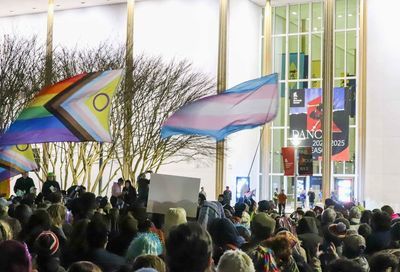Trans woman files for emergency injunction to stop Georgia prison officials’ retaliation against her
Ashley Diamond claims she's been subjected to more sexual abuse and harassment since filing a lawsuit against the state Department of Corrections.

Lawyers for an incarcerated transgender woman in the custody of the Georgia Department of Corrections have filed for an emergency injunction to stop prison officials from retaliating against her due to two lawsuits she filed alleging the department had violated her constitutional rights.
Ashley Diamond, a Black transgender woman currently housed in Coastal State Prison in Garden City, Georgia, says that since being re-incarcerated in 2019, prison officials have refused to comply with their obligations to protect her from violence and sexual abuse, and provide her with gender-affirming medical care.
Diamond, who sued the department in 2015 for violating her Eighth Amendment right to freedom from cruel and unusual punishment as it relates to her medical treatment, which has exacerbated her gender dysphoria and led her to attempt suicide and self-castration multiple times.
The initial denial of care stemmed from a mistake on her intake form that failed to recognize Diamond as a transgender woman, even though she has identified as such since age 15 and had been receiving medical treatment from age 17 until 2012, when it was disrupted by her first incarceration. However, under the department’s own “freeze-frame” policy, Diamond, who was receiving hormones to treat her gender dysphoria prior to entering prison, should have been eligible to continue receiving them.
Diamond, who at the time, was housed in Valdosta State Prison, suffered mistreatment at the hands of prison guards, who refused to recognize her gender identity, ridiculed her in front of other inmates, punished her by placing her in solitary confinement for presenting as a woman, and failed to take action to stop her from being harassed, raped, and repeatedly sexually abused by other inmates.
In 2016, the Department of Corrections settled the first lawsuit, in which the department agreed to pay Diamond an undisclosed financial amount, rescind its “freeze-frame” policy, adopt a sexual assault prevention policy that is in line with federal standards, and provide cultural competency training to prison staffers.
Diamond was released from prison after the lawsuit was filed, but re-entered the custody of the department following a parole violation in 2019. But upon returning to prison, she learned that the department had failed to abide by the terms required by the settlement and continued to deny her access to health care. When she objected to this, prison officials doubled down on their mistreatment of her, forcing her to file a second lawsuit against the department, alleging that its failure to abide by the terms of the previous settlement, and officials’ indifference to her plight, violated her Eighth Amendment rights, as well as her right to equal protection under the Fourteenth Amendment.
Additionally, upon re-entering prison in 2019, Diamond was denied a request to be housed in a female facility for her own safety, pointing to multiple sexual assaults that she had experienced while incarcerated. Yet even though the Department of Corrections’ own policy requires officials to give “serious consideration” to such requests, the department abides by an unwritten, unofficial policy that categorically denies all requests from transgender women to be housed in female prisons, regardless of individual circumstances.
See also: Federal court orders Illinois prisons to overhaul how they deal with transgender inmates
As a result, she was placed in yet another men’s facility and subjected to additional sexual assaults — 16 in total since 2019 alone. Ten of those assaults occurred in Costal State Prison — where Diamond is currently housed — due to prison officials telling other inmates that Diamond was a “freak” and a “snitch” and leaking details from her confidential Prison Rape Elimination Act reports, including information about her gender identity.
The other six occurred while she was previously incarcerated at the Georgia Diagnostic Classification Prison, a closed-security male prison where she was preyed upon by staff and other incarcerated people alike. The two most recent assaults at Coastal have occurred in the last month.
To make matters worse, Diamond and her lawyers, who are affiliated with the Center for Constitutional Rights and the Southern Poverty Law Center, allege that prison officials have retaliated against her for her past lawsuits. Diamond claims officials altered her files to change her security designation from victim to perpetrators, and pressured another male inmate to lie and say she sexually assaulted him — something that would be impossible given her most recent attempts at self-castration. When he refused to lie, they put him in prolonged solitary confinement, and then, when he refused again, they transferred him to a more violent housing unit.
Additionally, Diamond claims, corrections officials have been punishing her for alleged rule violations that are either fabricated or based on tiny infractions that are typically not enforced against other inmates. Those actions were done to deliberately mess with her eligibility for parole, postponing it from March 2021 to April 2022.
Diamond says she’s devastated by her mistreatment and continues to be harassed, assaulted, and denied medical care and gender-affirming canteen items, such as hair removal products and other accommodations for her gender expression. This treatment, according to her lawyers, has increased her feelings of depression, anxiety, and led her to repeatedly attempt suicide and self-castration, pushing her to “her breaking point” and “stripp[ing] her of the will to live.”

As a result of these ongoing abuses of power and failure to comply with their constitutional obligations, as well as their previous settlement agreement, Diamond’s legal team has no option left but to seek an emergency injunction from a federal judge to prevent prison officials’ continued retaliation. The petition for an emergency injunction was filed on Friday in U.S. District Court for the Middle District of Georgia.
Diamond’s legal team is also asking she be transferred immediately to a women’s prison for her own safety.
“It goes without saying that a men’s prison is no place for a woman,” Beth Littrell, a senior attorney with the Southern Poverty Law Center, said in a statement. “Yet, Georgia insists on keeping Ashley housed in men’s prisons where, as any woman would be, she is exposed to repeated sexual victimization and daily sexual harassment. It’s not only unconstitutional — it’s unconscionable.”
“The message Georgia is sending trans people in custody is that our lives and existences simply do not matter,” Diamond said in a statement. “But I know better. Georgia’s actions toward me and other trans prisoners are a systemic abuse of power, authority, and moral decency.”
One of Diamond’s lawyers, Chinyere Ezie, a senior staff attorney at the Center for Constitutional Rights, told Metro Weekly in an interview that she expects the Middle District of Georgia will arrange a hearing, either virtual or in-person, sometime in May to take up the request for an injunction.
“We think we’ll have a ruling by May that would address Ashley’s safety concerns, which remain very prevalent, since she is housed in this male prison where, just last month, she faced more sexual abuse and taunts and harassment. It’s a constant challenge that she faces in this male prison environment, along with the ongoing denials of health care that are causing such terrible side effects,” Ezie said.
“It has become clear that Georgia is not going to voluntarily comply with the Constitution; it has to be forced to do so,” Ezie added. “…If all of our motions are granted, both the motion for a preliminary injunction and the motion for a protective order, it would require that [the Georgia Department of Corrections] transfer Ashley to a female facility, that they provide her gender dysphoria treatment, and that they stop retaliating against her and other witnesses in this case. The penalty for failing to do that would be monetary sanctions, and there could be other judicial remedies. You’d basically be in contempt of the court at that point. So it is a very strong remedy and it’s one that’s necessary, again, because Georgia can’t seem to be bothered with the Constitution without a court order in front of them.”
Read more:
Caitlyn Jenner considering running for California governor in recall election
Tennessee House passes “Business Bathroom Bill” in effort to shame trans-friendly businesses
Wisconsin Republicans move to protect therapists engaged in conversion therapy
Support Metro Weekly’s Journalism
These are challenging times for news organizations. And yet it’s crucial we stay active and provide vital resources and information to both our local readers and the world. So won’t you please take a moment and consider supporting Metro Weekly with a membership? For as little as $5 a month, you can help ensure Metro Weekly magazine and MetroWeekly.com remain free, viable resources as we provide the best, most diverse, culturally-resonant LGBTQ coverage in both the D.C. region and around the world. Memberships come with exclusive perks and discounts, your own personal digital delivery of each week’s magazine (and an archive), access to our Member's Lounge when it launches this fall, and exclusive members-only items like Metro Weekly Membership Mugs and Tote Bags! Check out all our membership levels here and please join us today!


























You must be logged in to post a comment.